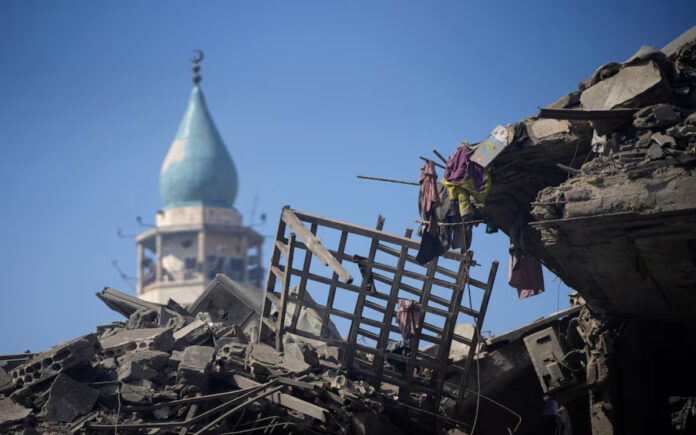Jerusalem: The United Nations reported on Sunday that Israeli tanks breached the gates of a UNIFIL (United Nations Interim Force in Lebanon) base in southern Lebanon, sparking the latest accusation of Israeli violations. The incident follows a series of alleged attacks, even condemned by Israel’s allies.
According to UNIFIL, two Israeli Merkava tanks destroyed the base’s main gate and forcibly entered before dawn. After the tanks departed, shells exploded 100 meters away, sending smoke across the base. Despite wearing gas masks, 15 U.N. personnel became ill and required treatment.
However, Israel’s military provided a different account, claiming that Hezbollah militants fired anti-tank missiles at Israeli troops, injuring 25 soldiers. The attack occurred near a UNIFIL post, and a tank involved in evacuating the wounded accidentally backed into the peacekeeper base. “It is not storming a base. It is not trying to enter a base. It was a tank under heavy fire, mass casualty event, backing up to get out of harm’s way,” Israeli military international spokesperson Nadav Shoshani said.
In a statement, the Israeli military explained that it deployed a smoke screen to cover the evacuation of injured soldiers, asserting that its actions posed no threat to the UNIFIL force. UNIFIL has reported that five of its peacekeepers have been wounded in recent days, with most of the incidents attributed to Israeli forces.
The U.N. peacekeeping force emphasized that any intentional attack on its personnel would constitute “a grave violation of international humanitarian law and Resolution 1701,” which governs its mission.
Earlier on Sunday, Israeli Prime Minister Benjamin Netanyahu addressed U.N. Secretary-General António Guterres, urging the withdrawal of UNIFIL forces from areas under Hezbollah control and active combat zones. Netanyahu added, “The IDF has repeatedly requested this but has been denied, resulting in Hezbollah using peacekeepers as human shields.”
Hezbollah, which Israel has been battling in southern Lebanon since the beginning of its current military operation, has denied using U.N. peacekeepers for protection.
The ongoing conflict between Israel and Hezbollah reignited a year ago when the Iran-backed group launched rockets at northern Israel, supporting Hamas amid the Gaza conflict. In recent weeks, the violence has escalated significantly. On Sunday, a drone strike in the northern Israeli town of Binyamina injured at least 20 people, according to N12 News.
International Response
Italian Prime Minister Giorgia Meloni, typically a staunch supporter of Israel in Western Europe, spoke with Netanyahu by phone on Sunday, condemning the “unacceptable” Israeli attacks, according to her office.
Netanyahu expressed regret for any harm done to UNIFIL personnel, stating, “Israel will make every effort to prevent UNIFIL casualties and will do what it takes to win the war,” in a post on X (formerly Twitter).
Italy, one of the largest contributors to the 10,000-strong UNIFIL force, has over a thousand troops deployed in southern Lebanon. France and Spain, each with nearly 700 soldiers in the force, have also condemned the Israeli actions.
The UNIFIL force, comprising peacekeepers from 50 countries, has been present in southern Lebanon since 1978. The region has experienced decades of conflict, including Israel’s 1982 invasion, a 2000 occupation, and the 2006 war against Hezbollah, which ended with a ceasefire monitored by UNIFIL.
In recent weeks, Israel’s offensive has displaced 1.2 million Lebanese and inflicted heavy losses on Hezbollah, with the group’s senior leadership suffering significant casualties. Lebanon’s government reports that more than 2,100 people have been killed, with 10,000 others wounded in over a year of fighting, primarily in recent weeks. This figure includes women and children, though it does not differentiate between civilians and combatants.
Israeli officials argue that UNIFIL has failed in its duty to uphold U.N. Resolution 1701, passed after the 2006 war. The resolution mandates that southern Lebanon be free of any armed forces other than the Lebanese state.
Also Read | Israel Eyes Retaliation Against Iran’s Military, Energy Sites, US Officials Report
U.S. Involvement
U.S. Defense Secretary Lloyd Austin, in a Saturday call with Israeli Defense Minister Yoav Gallant, expressed “deep concern” over reports of Israeli forces firing on peacekeeper positions. He urged Israel to ensure the safety of UNIFIL personnel and the Lebanese military, which remains uninvolved in the Israel-Hezbollah conflict.
Weeks earlier, Israel had already instructed U.N. peacekeepers to prepare to relocate more than 5 kilometers from the Israeli-Lebanese border, as seen in a message obtained by Reuters.
Rising Tensions with Iran
The broader Middle East remains on high alert, with concerns that Israel might retaliate against Iran after an October 1 missile barrage launched in response to Israel’s operations in Lebanon. Iran’s Foreign Minister Abbas Araqchi stated on Sunday that the country has “no red lines” in defending itself, signaling Tehran’s readiness to respond to any Israeli attack. This follows a series of strikes earlier this year, during which Iran did not retaliate immediately.



